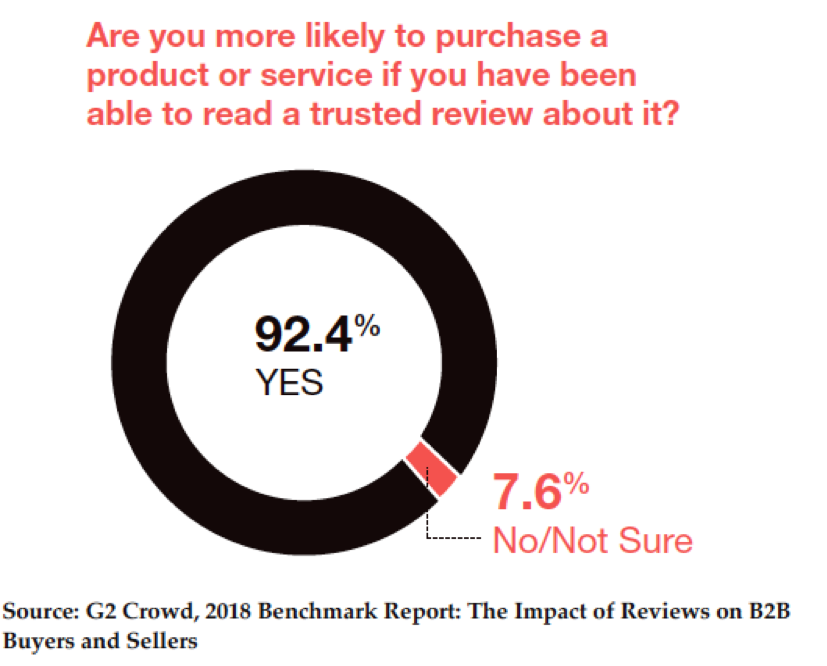Online reviews and testimonials are most often associated with B2C marketing. And although online reviews are not a driving force in the B2B realm, they do still hold weight. So, how can you use them to increase credibility and authenticity in your brand?
 Where B2C companies are actively soliciting reviews to increase their presence and good name on sites like Yelp, Amazon and Trip Advisor, the reviews B2B companies garner are usually feedback through customer service channels or social accounts.
Where B2C companies are actively soliciting reviews to increase their presence and good name on sites like Yelp, Amazon and Trip Advisor, the reviews B2B companies garner are usually feedback through customer service channels or social accounts.
B2B companies rarely, if ever, solicit reviews, so if someone has something to say about their product or service, the feedback is generally a strong positive or strong negative. Those strong emotions are the parallel between B2C and B2B reviews and are part of the need for what’s called ‘social proof’ even in the B2B realm.
What is Social Proof and Why Does it Matter for B2B
’Social Proof’ is the latest way of talking about word of mouth. Word of mouth marketing is arguably the most effective type of marketing in any industry. Humans are social creatures who naturally look to their peers for input, so buying decisions can be swayed one way or another based on a review.
According to a Corporate Executive Board survey, B2B buyers complete 60 percent of the purchase process before they ever directly engage with a vendor. Some of that “pre-purchase research” will be reading online reviews.
What drives the phrase ‘social proof’ is the new emphasis on digital. Word of mouth isn’t just talking to your friends or colleagues in person anymore. We have so many digital avenues now to share experiences: websites, social media pages, YouTube videos, etc. Your audience doesn’t want to be sold to, they want to be educated, and part of that education is learning about the experiences of previous customers.
Online Reviews Shape Decisions
According to G2 Crowd, a peer-to-peer review site that attempts to identify fraudulent user reviews “92% of B2B buyers use online review sites to get information and recommendations to support their purchase decisions.”
 The truth is that in an overwhelming number of cases, B2B customers are making financial investments that are much larger than those made by B2C. So, reviews during the research and investigation process of buying are extremely valuable. GS Crowd goes on to say that in many cases, 71% of buyers in the B2B realm actively seek reviews.
The truth is that in an overwhelming number of cases, B2B customers are making financial investments that are much larger than those made by B2C. So, reviews during the research and investigation process of buying are extremely valuable. GS Crowd goes on to say that in many cases, 71% of buyers in the B2B realm actively seek reviews.
The bottom line is having good things written about your products and services is a recipe for good business, strong marketing and market differentiation in any industry. They also help with customer retention and business growth.
Fear Not the Negative Review
A common fear is, what if we get a negative review? We would prefer to have nothing said about us, then have something negative out there. This thought process, although completely natural, is a bit flawed. Negative reviews can in fact help you earn the trust of a potential customer: diverse reviews show a company’s credibility. If your company wants some street cred, one of the best things they can do is show the good, the bad and the ugly. That means, display reviews no matter what they are. While it may seem counterintuitive, negative reviews can have a positive impact because they establish credibility and authenticity. No one and nothing is liked by 100% of the people, 100% of the time.
This perspective on the positive impact of negative reviews is substantiated in research as well. G2 Crowd surveyed B2B buyers on how they felt when seeing a negative review for a B2B vendor. 72% of those surveyed said that “negative reviews give depth and insight into a product,” with an additional 40% indicating that it helped make the review profile more credible.
I don’t know about you, but only seeing 5-star reviews when doing research on items I am interested in raises my antenna. I think to myself, are these reviews false? Are they done by company personnel? Showing only all glowing reviews should give pause, not confidence.
Reviews, Testimonials, Social Proof, Case Studies…
B2B marketers are probably very familiar with one type of customer feedback format: the case study or case history. This is a more structured format that is often hand-picked by markets to present only the best customer experiences, but it’s still a popular way to present this kind of data. Social proof differs from these constructed reviews by showing unfiltered, unaltered feedback directly from customers (sure, they can be stylized to match the formatting on your website, etc., but the content is not touched).
Call it what you will, but obtaining customer feedback can only help grow sales, boost brand awareness and keep customers engaged and coming back for more.
People like reviews. They seek them out. They trust them. According to an article from Elevation Marketing, 97% of B2B buyers say user generated content, like a review, is much more credible than other types of content. The reason for this is because people want to hear what other customers have to say, and not just what a company wants you to hear.
NEW FOR 2022: Roadmap to Better Ranking
 Due to the latest search algorithm update from Google, product reviews are becoming even more important for SEO.
Due to the latest search algorithm update from Google, product reviews are becoming even more important for SEO.
Websites with product reviews are shown at the top and rank higher. The websites without product reviews may lower in the ranking causing a decrease in traffic. However, there are ways to fix and avoid your website from getting affected. By adding visuals such as graphics and videos, it demonstrates credibility for your product.
Another way is to include links that lead to other sellers in order to give choices to consumers. Keeping track of your website ranking and traffic can give insight to the impact of the new Google update.
So, to answer the question we started with, do online reviews really impact your B2B business? The answer is yes! And chances are, they will impact your business in the most positive way possible. They will help boost conversions, increase customer trust, as well as speed up the selling process. They cost you zero dollars to obtain and can be used throughout all of your digital marketing channels. Sounds like a win-win to us!
